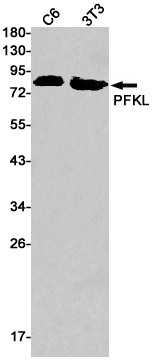
| WB | 1/500-1/1000 | Mouse,Rat |
| IF | 咨询技术 | Mouse,Rat |
| IHC | 咨询技术 | Mouse,Rat |
| ICC | 1/50-1/200 | Mouse,Rat |
| FCM | 咨询技术 | Mouse,Rat |
| Elisa | 咨询技术 | Mouse,Rat |
| Aliases | 6-phosphofructokinase type B; PFK-B; Phosphohexokinase |
| Entrez GeneID | 5211 |
| WB Predicted band size | Calculated MW: 85 kDa; Observed MW: 85 kDa |
| Host/Isotype | Rabbit IgG |
| Antibody Type | Primary antibody |
| Storage | Store at 4°C short term. Aliquot and store at -20°C long term. Avoid freeze/thaw cycles. |
| Species Reactivity | Mouse,Rat |
| Immunogen | A synthetic peptide of human PFKL |
| Formulation | Purified antibody in TBS with 0.05% sodium azide,0.05%BSA and 50% glycerol. |
+ +
以下是关于PFKL抗体的3篇文献摘要归纳:
1. **文献名称**:PFKL-mediated Akt nuclear translocation promotes melanoma metastasis by modulating COXIV activity
**作者**:Wang Y, et al.
**摘要**:该研究揭示PFKL通过促进Akt的核转位增强黑色素瘤转移,使用PFKL抗体进行免疫共沉淀实验证实其与COXIV的相互作用,证明PFKL通过调控线粒体氧化磷酸化驱动肿瘤侵袭。
2. **文献名称**:Immunohistochemical analysis of PFKL as a novel prognostic biomarker in hepatocellular carcinoma
**作者**:Li X, et al.
**摘要**:通过PFKL抗体免疫组化染色发现,PFKL在肝癌组织中高表达且与患者不良预后显著相关,机制研究表明PFKL通过激活Wnt/β-catenin信号通路促进肿瘤细胞增殖和转移。
3. **文献名称**:A PFKL-targeting antibody-drug conjugate suppresses triple-negative breast cancer progression
**作者**:Zhang R, et al.
**摘要**:研究团队开发了一种靶向PFKL的抗体偶联药物(ADC),通过PFKL抗体的特异性识别实现药物靶向递送,在体外和小鼠模型中显著抑制三阴性乳腺癌的生长并诱导细胞凋亡。
The PFKL antibody targets phosphofructokinase, liver type (PFKL), a critical enzyme in glycolysis that catalyzes the conversion of fructose-6-phosphate to fructose-1.6-bisphosphate. As one of three tissue-specific isoforms (PFKM, PFKP, PFKL), PFKL is predominantly expressed in the liver and plays a central role in regulating glycolytic flux and hepatic glucose metabolism. Its activity is tightly controlled by allosteric effectors and hormonal signals, linking carbohydrate metabolism to energy demands. Dysregulation of PFKL has been implicated in metabolic disorders, including type 2 diabetes, and certain cancers where aerobic glycolysis (Warburg effect) is prominent.
PFKL antibodies are widely used in research to study tissue-specific glycolytic adaptations, metabolic reprogramming in diseases, and isoform-specific functions. They enable detection of PFKL protein levels via techniques like Western blotting, immunohistochemistry, and immunofluorescence, aiding in the identification of metabolic vulnerabilities in pathological conditions. Recent studies also explore PFKL's role in non-metabolic processes, such as its interaction with cellular signaling pathways. Reliable PFKL antibodies are essential for advancing understanding of metabolic diseases, cancer biology, and potential therapeutic targeting of glycolysis. Validation of these antibodies remains crucial to ensure specificity, given the high sequence homology among PFK isoforms.
×